2024 Scholars
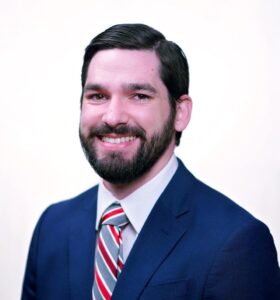
Nicholas Callais, M.D.
Mentor: Marie Burdine, Ph.D., Assistant Professor of Surgery
Interests: Novel targets for therapeutic immunosuppression in transplant patients
Nicholas Callais is a Surgical Resident in the Department of Surgery under the mentorship of Marie Burdine, Ph.D. His research focuses on evaluating DNA-PK(cs) as a novel target for therapeutic immunosuppression in transplant patients. Although the number of patients receiving transplants has increased steadily, the development of more effective anti-rejection drugs has stagnated. Unfortunately, although these immunosuppressants greatly reduce acute cellular organ rejection, there is still a need to address long-term outcomes due to their limited effect on staving off antibody-mediated rejection (AMR). As a means to combat rejection on this front, Callais’s research focuses on further understanding the role of a protein called DNA-dependent kinase catalytic subunit (DNA-PKcs) in the immune system. His work has provided both molecular and translational evidence suggesting that DNA-PKcs is a prime target for immunosuppression therapy. As a scholar in the TL1 program, he plans to facilitate the process of moving a DNA-PK(cs) inhibitor from pre-clinical models to clinical trials. He will specifically focus on the effects on delayed graft function and AMR.
Callais graduated with a Bachelor of Science from Nicholls State University in 2017. He then went on to earn his Medical Doctorate from Louisiana State University Health Science Center Shreveport in 2022. He joined UAMS as a resident in the summer of 2022.

Alexa C Escapita, Ph.D.
Mentor: Hari Eswaran, Ph.D., Professor and Vice Chair for Research, Department of Obstetrics and Gynecology
Interests: Using optically pumped magnetometers to detect early neurodevelopment delays in children from high-risk pregnancies
Alexa Escapita, Ph.D., is a postdoctoral fellow training in the lab of Hari Eswaran, Ph.D., in the Department of Obstetrics and Gynecology. Escapita’s research focuses on identifying early neurophysiologic precursors to clinical manifestation of developmental delays. Children of mothers with diabetes are at high risk of developmental delays, especially those with a lower socioeconomic status. As a postdoctoral fellow, Escapita plans to test the feasibility of using optically pumped magnetometers (OPMs) to record brain activity in neonates and compare them to current gold standard. She also plans to use her training in multiple neurodevelopmental assessment tools to evaluate the neurodevelopment of these children. Overall, Escapita aims to bring this novel technology that is low-cost and accessible. She will do so by using her entrepreneurial skills gained in graduate school to communicate with key stakeholders about their needs in this area.
In 2024, Escapita was awarded a Ph.D. degree from the Department of Neurobiology and Developmental Sciences. She completed her dissertation work under the mentorship of Tara Johnson M.D. Her work was focused on the neurodevelopment of children with congenital heart disease. During her graduate training, she was trained in four well-known developmental assessment tools which she plans to use during her postdoctoral fellowship. She also took part in the Health Sciences Entrepreneurship Boot Camp through BioVentures, her first year in graduate school and gained a unique entrepreneurial experience. This boot camp is what led her to pursue entrepreneurship.
2023 Scholars
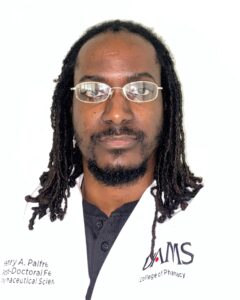
Henry A. Palfrey, PhD
Mentor: John D. Imig, Ph.D., Chair and Professor, Department of Pharmaceutical Sciences; Vice President for Therapeutics, BioVentures
Interests: Pharmacotherapy of radiation-induced kidney and cardiovascular diseases
Henry A. Palfrey, Ph.D., is a postdoctoral fellow training in the laboratory of John D. Imig, Ph.D., in the Department of Pharmaceutical Sciences in the College of Pharmacy. Henry’s research goal is to conduct studies to screen a library of compounds and determine the ability of novel epoxylipid drugs to provide protection against radiation-induced kidney and cardiovascular injury. Part of his work is also being done in collaboration with a synthetic chemist in the United States and Europe. Radiation nephropathy is a type of kidney injury caused by ionizing radiation exposures, occurring after radiotherapy for bone marrow transplantation, cancer or after partial / whole body accidental exposures. Epoxylipids, such as epoxyeicosatrienoic acids (EET) analogs, provide the potential to treat radiation nephropathy through their endothelial protective and antihypertensive actions. Overall, these efforts aim to address the need for developing effective pharmacotherapeutic agents to work alongside current radiotherapy treatments.
Henry earned his Ph.D. degree in Environmental Toxicology at Southern University and A&M College in 2020 under the mentorship of Subramanyam N. Murthy, Ph.D. His doctoral dissertation research focused on investigating cardiovascular structural and biochemical changes in rodents fed atherogenic diets. At Southern University, he was awarded oral and poster presentation awards, two academic scholarships, and was afforded the opportunity to train at the LSU Pennington Biomedical Research Center. His pre-doctoral tenure also included selection into the student summer research program at the federal Food and Drug Administration (FDA) National Center for Toxicological Research in Jefferson, AR, in 2016 and 2017.
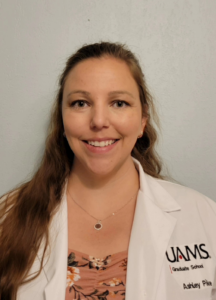
Ashley Pike, Ph.D.
Mentor: Tatiana Wolfe, PhD, Assistant Professor of Psychiatry
Research Interests: Cognition in multiple sclerosis
Ashley Pike, Ph.D., is a postdoctoral fellow in the Brain Imaging Research Center of the Psychiatric Research Institute (PRI). Her mentor is Tatiana Wolfe, Ph.D., an assistant professor and medical imaging physicist in the College of Medicine Department of Psychiatry. Pike’s primary research goal is to implement advanced neuroimaging techniques for clinical problem solving in multiple sclerosis (MS). Her aim is to contribute to the improved diagnosis and treatment of clinical and cognitive deficits among patients with MS and other disorders of myelin. Beyond her work in neuroimaging, Pike possesses a profound interest in the psychosocial dimensions of MS. She recognizes the significant impact of cognitive impairment on patients’ overall quality of life and is committed to unraveling its underlying mechanisms—an area that currently lacks effective treatment solutions. Her personal experience as an individual living with MS has deepened her dedication to advancing the realm of MS research and enhancing the lives of fellow individuals coping with the condition. Pike’s multifaceted approach to neuroimaging and her empathetic connection to those living with MS reflect her unwavering commitment to making a positive impact on both the scientific community and the lives of individuals affected by MS and other disorders of myelin.
In 2023, Pike earned her Ph.D. from the UAMS College of Medicine Department of Neurobiology and Developmental Sciences. In addition to the HSIE fellowship, she was honored with a predoctoral training scholarship from the T32 NIDA program at UAMS in 2022, underscoring her exceptional dedication and potential within her field.
2022 Scholars
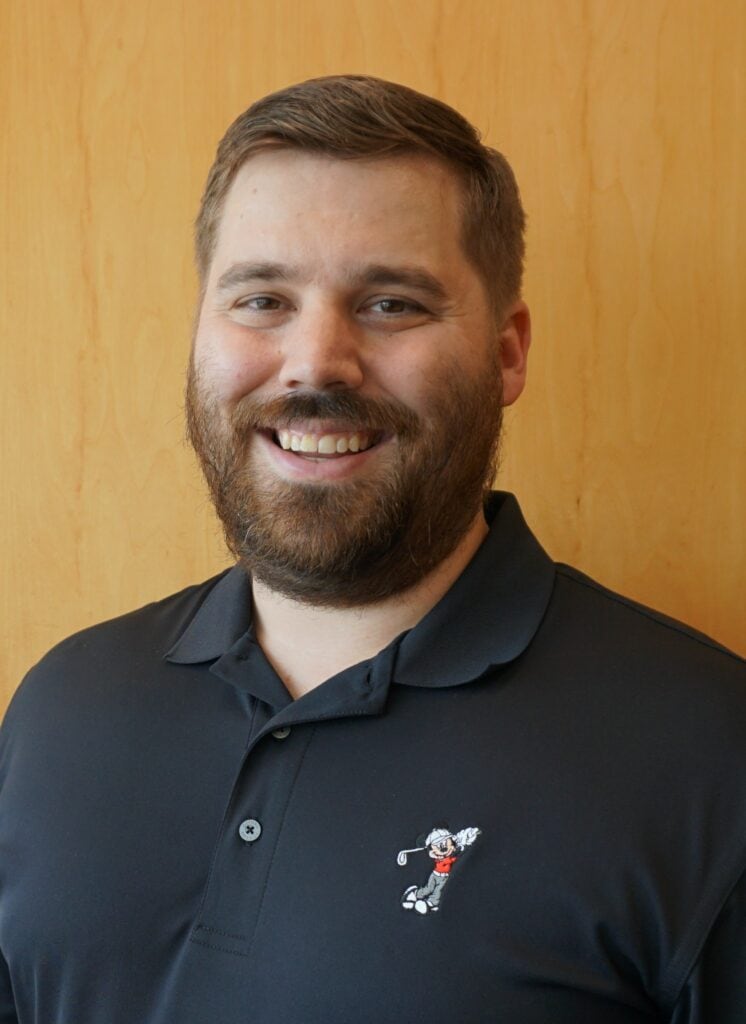
David D. Church, Ph.D.
Mentor: Arny Ferrando, Ph.D., Professor, Department of Geriatrics
Interests: Nutritional biomarkers of sarcopenia and diabetes
David Church, Ph.D., is an assistant professor in the Department of Geriatrics in the College of Medicine. His mentor is Arny Ferrando, Ph.D., a professor in the Department of Geriatrics. Church conducts studies to assess nutritional biomarkers of sarcopenia, which may have great utility compared to imaging equipment currently used to evaluate sarcopenia, and additionally may be patentable and present an opportunity to start a company to distribute the formula. The product could be easily packaged and shipped to rural health clinics that do not have access to imaging equipment. The product also may help to establish a universal standardized diagnostic criteria for sarcopenia and/or cancer cachexia. Church also conducts studies designed to leverage the vasodilator properties of PDE5 inhibitors to improve nutrient delivery to skeletal muscle in order to combat sarcopenia and other muscle wasting conditions. This project has the potential to result in new-use patent for existing PDE5 inhibitors.
Church was awarded the Ph.D. degree in exercise physiology from the University of Central Florida in 2018. As a result of his doctoral work, he developed a passion for understanding anabolism and catabolism of body protein, and the use of stable isotope tracers to quantify whole-body and muscle protein balance in stressed states. He arrived at UAMS in 2018 as a postdoctoral fellow in the Department of Geriatrics and became assistant professor in the department in 2022.

Lauren Russell Fitzgerald, Ph.D.
Mentor: Alison Oliveto, Ph.D., Professor, Department of Psychiatry
Interests: Pharmacotherapy of bupropion and buprenorphine SL to treat methamphetamine-opioid use
Lauren Russell Fitzgerald, Ph.D., is a postdoctoral fellow training in the laboratory of Alison Oliveto, Ph.D., in the College of Medicine Department of Psychiatry. Fitzgerald’s research focuses on comorbid methamphetamine use by individuals receiving medication for opioid use disorder (OUD) to achieve improved treatment outcomes. Dual methamphetamine-opioid use is associated with increased homelessness, daily injection drug use, the reuse and sharing of syringes, and fatal and non-fatal drug overdose. The overarching goal of Fitzgerald’s research is to demonstrate that combined pharmacotherapy of bupropion and buprenorphine SL is a beneficial treatment strategy for dual methamphetamine-opioid use. The combination therapy effectively results in mu opioid agonism (to treat OUD), kappa opioid antagonism (to treat methamphetamine use disorder (MUD)) and norepinephrine-dopamine reuptake inhibition (to treat MUD). Effectiveness of the combined pharmacotherapy will be evaluated by the reduction in methamphetamine use, decrease in adverse outcomes, change in DSM-5 disease status, and changes in drug use pattern during a multisite, double-blind, two-stage, placebo-controlled trial. The combined pharmacotherapy versus placebo will be evaluated for safety and efficacy at 12 and 16 weeks.
Fitzgerald was awarded the Ph.D. degree from the Department of Pharmacology and Toxicology at UAMS in 2022 under the mentorship of William Fantegrossi, Ph.D.
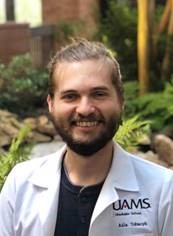
Stephen Shrum, Ph.D.
Mentor: Cesar Compadre, Ph.D., Department of Pharmaceutical Sciences
Interests: Developing toxoflexerol as an oral radiomitigator for use in radiological emergencies
Stephen Shrum, Ph.D., is a postdoctoral fellow in the Department of Pharmaceutical Sciences in the College of Pharmacy. His mentor is Cesar Compadre, Ph.D., a professor in the same department. Shrum’s primary research goal is to develop compounds to satisfy the currently unmet need for safe and effective radiological and nuclear medical countermeasures that can be used clinically in emergency situations. Although a nuclear catastrophe would have serious health consequences to potentially millions of people, there are no safe and effective radioprotector or radiomitigator products suitable for stockpiling that can be administered before or after radiation exposure, respectively, to alleviate radiation injury and offer multi-organ protection. Vitamin E tocotrienols have remarkable radioprotective activity when administered subcutaneously, protecting the hematopoietic, gastrointestinal, and other systems against radiation, with very low toxicity.
Shrum was awarded the Ph.D. degree in 2021 from the Department of Pharmacology and Toxicology. He was a postdoctoral fellow at Tocol Pharmaceuticals, LLC in Little Rock, Arkansas prior to joining the Department of Pharmaceutical Sciences in 2022.
2021 Scholars
Kindann Fawcett, Ph.D.

Mentor: Aravindhan Veerapandiyan, M.D., Assistant Professor of Pediatrics, Division of Pediatric Neurology
Interests: Best nutritional practice for children with Duchenne and Becker muscular dystrophies
Kindann Fawcett is a postdoctoral fellow in the Department of Pediatrics and the Arkansas Children’s Research Institute. Her mentor is Aravindhan Veerapandiyan, M.D., a child neurologist and director of the Comprehensive Neuromuscular Program at Arkansas Children’s Hospital. Fawcett’s research focuses on improving nutrition in pediatric populations with rare diseases, particularly children with neuromuscular diseases such as Duchenne and Becker Muscular Dystrophies (DBMD). She is developing tools to direct best nutritional practice for children with DBMD. Additionally, Fawcett is designing a digital media-learning platform to provide an improved nutrition and exercise curriculum for youth. She works closely with practitioners to educate families about the importance of nutrition and integrating lifestyle changes into daily routines.
Fawcett earned her bachelor’s degree in nutritional sciences from Oklahoma State University in 2005 and was awarded a Ph.D. in behavioral health sciences from the University of Arkansas, Fayetteville in 2011. She spent the last 11 years developing her expertise as a scientist, nutrition advocate, public health educator and health and wellness business professional. She has served as an adjunct faculty member at the University of Arkansas, Kaplan University, Arkansas State University-Beebe, and finally as a postdoctoral fellow in Dr. Aline Andre’s laboratory at the Arkansas Children’s Nutrition Center, focusing on maternal and infant nutritional health.
Tiffany Miles, Ph.D.

Mentor: Angus Macnicol, Ph.D., Professor of Neurobiology and Developmental Sciences
Interest: Educational programs that target maternal nutrition
Tiffany Miles, Ph.D., is a postdoctoral fellow in the UAMS College of Medicine Department of Neurobiology and Developmental Sciences mentored by Angus Macnicol, Ph.D. Miles’ research focuses on elucidating mechanisms in the anterior pituitary that alter the metabolism of offspring born to malnourished mothers. Using a maternal undernutrition model in rodents, Miles analyzes hormone levels in serum, urine, and target tissues to identify predictors of obesity in adult offspring. She also conducts multi-omic profiling to discover mechanisms of pituitary dysfunction and hormone dysregulation in offspring of malnourished mothers. The overall goal is to understand the impact of maternal malnutrition on developmental programming to recognize predictors of obesity and design prophylactic clinical treatments. Integration of the knowledge gained from preclinical research and bedside knowledge also will lead to improved educational programs to promote improvement of maternal nutrition.
Miles earned a bachelor’s degree in biology with a concentration in secondary education at Louisiana State University in 2008. She was a 6th-grade science teacher from 2008 to 2014. In 2020, she completed her doctoral dissertation research in the interdisciplinary biomedical sciences Ph.D. program under the direction of Gwen Childs, Ph.D., chair of the UAMS Department of Neurobiology and Developmental Sciences. Miles plans to leverage her dual training in science and education to design fact-based educational programs to optimize maternal nutrition and raise community awareness of the impact of maternal nutrition on child health.
Thomas Nienaber, M.D.
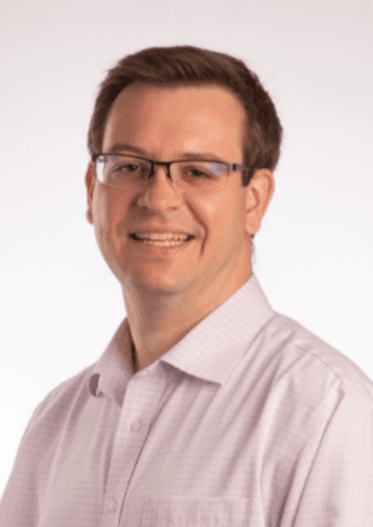
Mentor: Kevin Sexton, M.D., Associate Professor of Surgery; Director of BioVentures, LLC; Associate Chief Clinical Informatics Officer; Co-Director of Healthcare Analytics, Institute for Digital Health and Innovation; Co-Director, CTSA Health Science Innovation and Entrepreneurship Postdoctoral Training Program
Interest: Improved care of at-risk infants
Thomas Nienaber, M.D., is a neonatology fellow in the UAMS College of Medicine Department of Pediatrics, Division of Neonatology. His mentor is Kevin Sexton, M.D., director of Arkansas BioVentures, LLC, and associate chief clinical informatics officer at UAMS. Sexton serves in several other roles in the College of Medicine and the Translational Research Institute. Nienaber specializes in neonatal-perinatal medicine and the care of at-risk infants. He has invented a new “smart” endotracheal tube, designed specifically for use in critically ill newborns with the goal of increasing safety for intubated pediatric patients. He is the first clinical fellow to be admitted to the Health Science Innovation and Entrepreneurship training program.
Prior to residency and fellowship, Nienaber attended medical school at the University of Sydney, in Australia. He joined the HSIE postdoctoral training program in July 2021 while starting his final year of neonatology fellowship. He continues his research to refine the prototype design of the “smart” endotracheal tube, an invention that began in 2020 during participation in the Delta I-Fund program that trains start-up entrepreneurs with early-stage proof-of-concept inventions. Nienaber also recently co-founded ERGO Medical, LLC to continue development of his device.
Megan Reed, Ph.D.
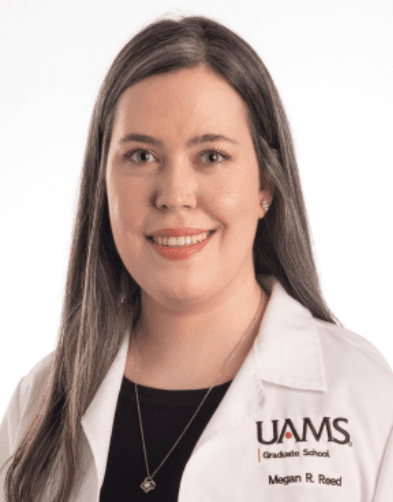
Mentors: Alan Tackett, Ph.D., Professor of Biochemistry and Molecular Biology; Deputy Director of the Winthrop P. Rockefeller Cancer Institute and Sharlau Family Endowed Chair for Cancer Research. Analiz Rodriguez, M.D., Ph.D., Assistant Professor of Neurosurgery, Director of Neurosurgical Oncology
Interests: 3-Dimensional tumor modeling, organoids, functional precision medicine
Megan Reed, Ph.D., is a postdoctoral fellow in the UAMS College of Medicine Department of Biochemistry and Molecular Biology and the Winthrop P. Rockefeller Cancer Institute. She is co-mentored by Alan Tackett, Ph.D., and Analiz Rodriguez, M.D., Ph.D. Reed’s research focuses on using patient-derived 3-dimensional tumor models as functional precision-medicine screening platforms to assess tumor sensitivity to chemotherapeutic drugs. High-grade brain tumors and brain metastases often exhibit abysmal responses to standard-of-care chemotherapeutics and responders show high rates of recurrence, in part due to tumor heterogeneity. Organoid model systems provide heterogeneity and recapitulate the patient-specific tumor microenvironment. As a postdoctoral fellow, Reed plans to use a combination of comparative transcriptomics/proteomics and functional validation of target compounds in 3-D patient-derived tumor models to optimize chemotherapy regimens and improve patient outcomes. A comparative transcriptomics platform will analyze tumor gene expression patterns to identify upregulated pathways linked to druggable endpoints.
Reed earned her bachelor’s degree in biology at Henderson State University in 2014. She completed her Ph.D. in the College of Medicine Department of Biochemistry and Molecular Biology in 2021 under the mentorship of Dr. Robert Eoff. Her doctoral dissertation research focused on elucidating novel cellular mechanisms of translesion synthesis polymerases that contribute to the development of resistance to chemotherapeutic agents in patients with glioblastoma.
Julia Tobacyk, Ph.D.
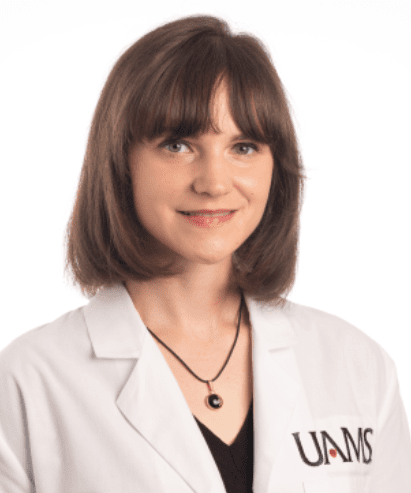
Mentor: Lisa Brents, Ph.D., Assistant Professor of Pharmacology and Toxicology
Interest: Improving treatment strategies to mitigate opioid use disorder in pregnant women
Julia Tobacyk, Ph.D. is a postdoctoral fellow in the UAMS College of Medicine Department of Pharmacology and Toxicology under the mentorship of Lisa Brents, Ph.D. Her research focuses on developing innovative treatment strategies for opioid use disorder (OUD), which can be administered to pregnant women without adversely affecting the fetus. The gold standard treatment for OUD during pregnancy is an opioid called buprenorphine. However, an adverse effect of buprenorphine is fetal opioid dependence that leads to withdrawal symptoms after birth, known as neonatal opioid withdrawal syndrome (NOWS). The goal of Tobacyk’s project is to improve OUD treatment during pregnancy by reducing exposure of the fetus to buprenorphine while maintaining the ability of the drug to mitigate dependence/addiction in the pregnant mother.
Tobacyk earned her bachelor’s degree in biology and chemistry at Louisiana Tech University in 2014. She earned her Ph.D. in the UAMS College of Medicine Department of Pharmacology and Toxicology in 2021 under the mentorship of Lee Ann MacMillan-Crow, Ph.D. Her dissertation research focused on mechanisms of cold storage –induced injury in transplanted kidneys.
2020 Scholars
Emilie Darrigues, Ph.D.
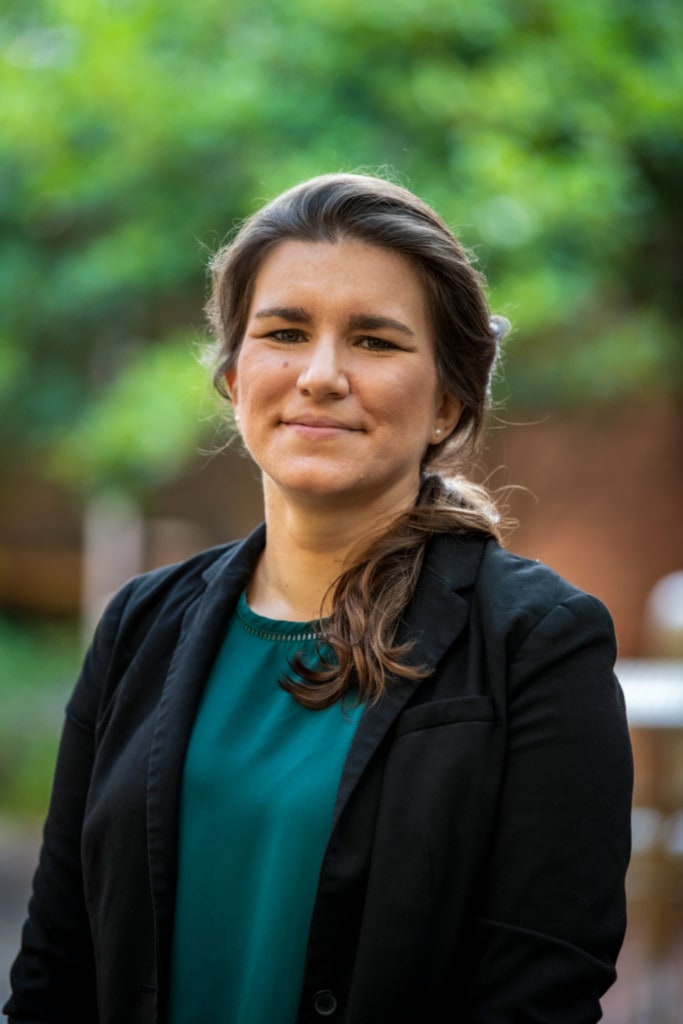
Mentor: Analiz Rodriguez, M.D., Ph.D., Assistant Professor of Neurosurgery
Interests: Glioblastoma Therapies
Emilie Darrigues, Ph.D., is a postdoctoral fellow in the UAMS College of Medicine Department of Neurosurgery and the Winthrop P. Rockefeller Cancer Institute. Her mentor is Analiz Rodriguez, M.D., Ph.D., director of neurosurgical oncology. Darrigues’ research focuses on the development of personalized medicine platforms to improve diagnoses and therapies for primary and secondary brain tumors. As a member of Rodriguez’s research team, she supports the development of patient- derived tissues obtained from surgically resected tumors by establishing techniques to improve brain tumor biobanking. The development of cell lines from patient tumors for use as 3-D models (organoids/spheroids) also is pursued as a strategy to evaluate the therapeutic efficiency of cancer treatments. Darrigues also uses multi-omics profiling techniques (i.e. bulk and single cell transcriptomics) to evaluate ex vivo organoid systems for similarity to parent tumors. A mentored research project driven by the TL1 program is focused on the optimization of methylated circulating DNA in patient samples as a biomarker to optimize diagnostic kits.
Darrigues joined the TL1 program of the Translational Research Institute (TRI) in July 2020 after being awarded a Ph.D. in Applied Sciences from the University of Arkansas at Little Rock. The focus of her doctoral research, supported by NSF EPSCoR (CASE) funding, was to investigate and develop gold nanorods to aid in the imaging, active targeting, and treatment of 3-D organoids/spheroids composed of pancreatic cancer cells, stem-cells and cancer-associated fibroblasts. Prior to her Ph.D. program, Darrigues completed two master’s degrees in engineering and chemistry, as well as two bachelor’s degrees in chemistry and materials science/ nanotechnology. She also worked for five years in industry and start-up companies.
Shana Owens, Ph.D.

Mentor: Craig Forrest, Ph.D., Associate Professor of Microbiology and Immunology
Interests: Human Gammaherpesvirus Vaccines
Shana Owens, Ph.D., is a postdoctoral fellow in the Department of Microbiology and Immunology under the mentorship of Craig Forrest, Ph.D. Her research focuses on gammaherpesvirus (GHV) interactions with host germinal center responses during latent infection. GHVs are DNA tumor viruses that establish a lifelong chronic infection in B lymphocytes. Infection by human GHVs such as Epstein-Barr virus (EBV) and Kaposi sarcoma herpesvirus (KSHV) place individuals at risk of developing cancers, including Burkitt lymphoma, Hodgkin lymphoma, primary effusion lymphoma, and Kaposi sarcoma, among others. Immune compromised individuals, such as HIV/AIDS patients and transplants recipients, are at the highest risk of developing GHV-associated cancers. Currently no vaccines exist for EBV or KSHV. Over 90% of adults are infected with EBV and >38 million individuals are HIV+ across the globe, highlighting the need for a safe and effective GHV vaccine. Owens’ project focuses on developing replication-defective viruses as vaccine candidates for GHV infection.
Owens earned her bachelor’s degree in biology and biochemistry at the University of Arkansas at Monticello in 2014, and completed her Ph.D. dissertation in the UAMS College of Medicine Department of Microbiology and Immunology under the mentorship of Forrest in 2020.
John Sherrill, Ph.D., M.P.H.

Mentor: David Bumpass, M.D., Associate Professor of Orthopaedic Surgery
Interests: 3D Printing and Orthopaedic Devices
John Sherrill, Ph.D., is a postdoctoral fellow in the Department of Orthopaedic Surgery under the mentorship of David Bumpass, M.D. His research focuses on using 3-D printing techniques to develop innovative orthopaedic implants to improve patient outcomes. Back pain is a leading cause of disability in adults leading to more than 1.5 million spinal procedures each year. Incremental changes have made spinal implants more customizable to any given patient’s needs and desired outcome. However, most implants have exhibited the same basic design for decades. The expansion of 3-D printing, or additive manufacturing, is creating new options that were not possible with traditional manufacturing techniques. The value of 3-D printing in patient and medical education as well as preoperative planning is gaining more widespread acceptance. 3D printing also is used to produce intraoperative guides and some implants. However, the use of 3-D printing for patient-specific devices still is in its infancy, although patient-specific devices will allow surgeons to precisely plan for optimal postoperative positioning and curvature of the spine to improve successful outcomes and patient quality of life.
Sherrill earned his bachelor’s degree in chemistry at the University of Arkansas, Fayetteville in 2010. He earned a Master of Public Health at UAMS in 2016, and completed his Ph.D. dissertation in Interdisciplinary Biomedical Sciences at UAMS in 2020 under the mentorship of Erin Mannen in the College of Medicine Department of Orthopaedic Surgery.
Zachary Waldrip, Ph.D.

Mentor: Marie Burdine, Ph.D., Assistant Professor of Surgery
Interests: Novel Targets for Therapeutic Immunosuppression in Transplant Patients
Zachary Waldrip is a postdoctoral fellow in the Department of Surgery under the mentorship of Marie Burdine, Ph.D. His research focuses on evaluating DNA-PK(cs) as a novel target for therapeutic immunosuppression in transplant patients. Although the number of patients receiving transplants has increased steadily, the development of more effective anti-rejection drugs has stagnated. The introduction of calcineurin inhibitors as immunosuppressants for solid-organ transplant patients had a remarkable effect on extending the lifespan of transplanted organs, greatly improving the life expectancy of patients in end-stage organ failure. Unfortunately, although these immunosuppressants greatly reduce acute cellular organ rejection, there is still a need to address long-term outcomes due to their limited effect on staving off antibody-mediated rejection (AMR). As a means to combat rejection on this front, Waldrip’s research focuses on understanding the role of a protein called DNA-dependent kinase catalytic subunit (DNA-PKcs) in the immune system. His work has provided both molecular and translational evidence suggesting that DNA-PKcs is a prime target for immunosuppression therapy. As a scholar in the TL1 program, he plans to facilitate the process of moving a DNA-PK(cs) inhibitor from pre-clinical models to clinical trials.
Waldrip earned his bachelor’s degree in biochemistry and molecular biology from Hendrix College in 2010. He graduated from UAMS in 2017 with his Ph.D. in biochemistry and molecular biology from the laboratories of Alan Tackett, Ph.D. and Kevin Raney, Ph.D.
2019 Scholars
Samir Jenkins, Ph.D.
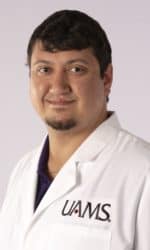
Mentor: Robert Griffin, Ph.D., Professor, Radiation Oncology
Interests: Nanomaterials and stem cell differentiation
Samir Jenkins, Ph.D., is a postdoctoral fellow in the UAMS College of Medicine Department of Radiation Oncology at UAMS under the mentorship of Robert Griffin, Ph.D., and Ruud Dings, Ph.D. His primary research areas focus on optimizing new therapeutics to more effectively treat primary and recurrent disease. This has included active targeting and treatment of cancers using a variety of gold, carbon, and liposomal nanomaterials. He has investigated new targets within the tumor itself and the associated vasculature, and has used nanomaterials to delivery drugs, thermal therapy, and enhanced radiotherapy to these regions. He has further investigated the use of heat, radiation, and immunotherapy in combination to enhance cancer treatment. His work has also involved the generation of new treatment resistant cancer and endothelial cell lines that can be used to uncover the mechanisms that make recurrent disease so intransigent. Additionally, his research is investigating the role of the gut microbiome in enabling and enhancing tumorigenesis in sites away from the gut itself. He received his Ph.D. in Chemistry at University of Arkansas under the mentorship of Prof. Jingyi Chen. The focus of his doctoral work was the synthesis, characterization, and application of novel nanomaterials to deal with biomedical issues. He developed several novel drug delivery systems, including one targeting resistant bacterial infections, and established new methods for characterization of nanomaterials in an in vivo setting. He also developed new laboratory modules to introduce undergraduates to nanomaterials synthesis and characterization.
Astha Malhotra, Ph.D.

Mentor: Jay Mehta, M.D., Ph.D., Professor, Internal Medicine – Cardiology
Interests: 3-D printing and tissue regeneration
Astha Malhotra, Ph.D. is a postdoctoral fellow in the College of Medicine. The HSIE Training Program will support her project that involves designing vascular models mimicking the natural architecture to study hypertension, thrombosis, and other vascular disorders.
There is an increasing global trend of hypertension and thrombosis, and one in four people is affected by either or both. These vascular disorders affect other major organs including the heart, brain, eyes, and kidneys. Drug development is challenging since the complete mechanistic studies are still elusive with lots of factors coming into play. Moreover, there is a lack of in vitro or controlled systems to study vascular disorders. This project will focus on designing a vascular model mimicking the natural architecture as an alternative to animal models to study these disorders. Other than the mechanistic studies, these models can be applied to evaluate cytotoxicity or for drug studies for new therapeutic targets.
Malhotra joined the UAMS College of Medicine in 2019. Prior to this, Malhotra was a postdoctoral bioengineer in the Head and Neck Regeneration Center at Mayo Clinic. Malhotra completed her doctoral dissertation at University of Central Florida in Chemistry and worked on materials and polymer processing.
Melody Penning Greer, Ph.D.

Mentor: Fred Prior, Ph.D., Professor and Chair, Biomedical Informatics
Interests: Algorithms to predict adverse events
Melody Penning, Ph.D., is an assistant professor in the Department of Biomedical Informatics in the College of Medicine. The HSIE Training Program will support her research in the detection and prevention of adverse events. There are approximately 1 billion outpatient visits and 35 million hospitalizations in the U.S. each year. Harms or adverse events (AE) caused during these healthcare encounters are pervasive, have a significant impact on patient wellbeing, and occur at a staggering rate. One of every ten hospitalized patients develops a healthcare acquired condition, and twelve million outpatients experience a diagnostic error, which may result in harm, every year. These events are typically tracked and quantified using incident reporting or retrospective surveillance with medical record review or claims data, although other methods are also available. None, however, captures all AEs. To ensure as many are detected as possible while at the same time, not overloading healthcare staff, automation has been introduced. Detecting AEs using rule-based algorithms makes automation possible, but this automation is only as good as the combination of the rules and the data they consume. Additionally, not all AE will be detectable using rules. Active errors occur at the point of contact between the patient and the healthcare system and are typically observable, whereas latent errors are process errors, where no single event is the source of the problem. AEs arising from active errors are more detectable than those arising from latent causes which are difficult to predict and therefore difficult to identify. Direct process observation or data mining are the best solutions to finding these types of situations. This research will develop improved adverse event detection methodologies for events arising from both active and latent errors.
Penning joined the College of Medicine faculty in the Department of Biomedical Informatics in 2017. She received her doctorate in Integrated Computing with an Information Quality focus from the University of Arkansas at Little Rock. This program is the result of a collaboration between the Massachusetts Institute of Technology and is the only one in the U.S. She is also certified in the Epic EHR data model. Prior to joining UAMS, Penning worked as a data scientist at an Arkansas startup technology company on record linkage for very large datasets.
Aaron Storey, Ph.D.
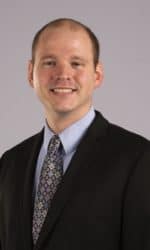
Mentor: Ricky Edmondson, Ph.D., Associate Professor of Myeloma Research
Interests: Mass spectrometry to identify bacteria in synovial fluid
Aaron Storey, Ph.D., is a postdoctoral fellow in the College of Medicine Department of Biochemistry and Molecular Biology at UAMS. The HSIE Training Program will support his research in using mass spectrometry to help identify pathogenic bacteria from pediatric septic arthritis clinical samples.
Pediatric septic arthritis is a rapid-onset bacterial infection of joint fluid in infants which can lead to irreversible joint destruction, organ failure, or death. Diagnosis and treatment of these cases must occur quickly and accurately to avoid long-term consequences from the infection. Because of the increasing prevalence of antibiotic-resistant bacteria, a reliable bacterial identification is needed to guide antibiotic selection. However, traditional culturing methods fail to identify the pathogenic species of pediatric septic arthritis in 20-50% of cases. This lack of growth delays treatment and increases the risk of long-term complications. These poor diagnostic markers, coupled with the narrow window of effective therapeutic intervention for septic arthritis, highlight the urgent need for the development of rapid, sensitive, and accurate techniques for bacterial identification of clinical samples. Storey’s project will use targeted mass spectrometry to detect bacteria from infected synovial fluid without the need to culture the samples for bacterial growth. If successful, this technology will lead to improved bacterial detection rates for pediatric septic arthritis cases.
Storey earned his bachelor’s degree in Behavioral Neuroscience at the University of Evansville in 2010 and completed his Ph.D. dissertation in Biochemistry and Molecular Biology at UAMS in 2017.
